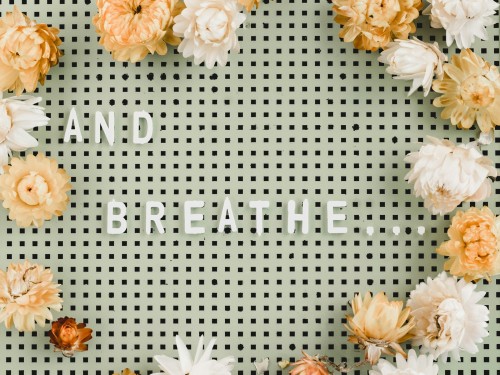How Mindfulness Can Transform Your Life and Help with Anxiety

posted 26th January 2025
In today’s fast-paced world, it’s easy to feel overwhelmed, stressed, or stuck in a cycle of anxiety. If this sounds familiar, know that you’re not alone. Many of my clients come to therapy feeling as though their worries dominate their lives, and they long for tools to find peace and balance. One approach I often recommend is mindfulness, which is a practice that can not only reduce anxiety, but can also transform how you experience life.
Mindfulness is the art of paying attention to the present moment without judgment. While it may sound simple, its effects can be profound and far-reaching. Let’s look at how mindfulness can help reduce anxiety and improve your overall well-being.
Understanding Anxiety: The Impact on Your Life
Before we dive into mindfulness, let’s acknowledge how anxiety can affect every aspect of life. Anxiety often feels like a constant buzz in the background, making it difficult to focus, relax, or even enjoy things you used to love. It can manifest as a racing heart, shallow breathing, muscle tension, or restless thoughts that seem impossible to quiet. Anxiety may feel like being trapped in an endless loop of worry about the past or fear of the future.
But here’s the good news: it doesn’t have to be this way. Mindfulness can offer a way to break free from the grip of anxiety and regain a sense of control and calm, along with CBT these modalities can be life alternating and allow you to regain, or find your love of life again.
How Mindfulness Reduces Anxiety
1. Breaking the Cycle of Overthinking
Anxiety often thrives on overthinking; analysing the past, worrying about the future, and creating endless "what-if" scenarios. Mindfulness helps you step out of this spiral by anchoring you in the present moment. When you focus on what is happening right now, the power of those anxious thoughts begins to fade. It’s like hitting the pause button on your mental chatter. That's not to say its a magic cure, as some anxiety will always crop up from time to time, as that is normal, and it won't stop overnight, because like any new endeavour, it will take time and practice.
2. Calming Your Nervous System
When you feel anxious, your body’s 'fight or flight' response kicks in, flooding you with stress hormones like cortisol. This response is helpful in emergencies but exhausting when it’s activated regularly or even constantly. Mindfulness practices, such as deep breathing or meditation, activate your parasympathetic nervous system, also known as your 'rest and digest' system. This brings your body back to a state of calm and helps you feel more grounded.
3. Building Emotional Awareness and Resilience
Mindfulness is a practice of observing your emotions without judgment. Instead of fighting or suppressing your thoughts or feelings, you learn to acknowledge them with curiosity and compassion. This approach can reduce the intensity of anxious thoughts and emotions, helping you respond to stress in a more balanced way. Over time, mindfulness can increase your emotional resilience, making it easier to handle life’s challenges.
The Broader Benefits of Mindfulness
Mindfulness isn’t just about managing anxiety; it’s about transforming your relationship with yourself and the world around you. Here are some of the broader benefits:
• Improved Self-Awareness: Mindfulness helps you recognise patterns in your thoughts and behaviours and his awareness empowers you to make conscious choices rather than reacting impulsively to stress.
• Better Sleep: Anxiety often disrupts sleep, but mindfulness can quiet your racing mind and improve the quality of your rest. Even a brief evening practice can make a difference.
• Enhanced Resilience: Mindfulness strengthens your ability to cope with setbacks and helps you to adapt to change; approaching life’s ups and downs with greater equanimity.
• Physical Health Benefits: Research has shown that mindfulness can lower blood pressure, reduce inflammation, and even boost your immune system. When your body feels better, your mind does too.
Practical Ways to Start Practicing Mindfulness
If you’re new to mindfulness, you might wonder where to begin. The good news is that you don’t need to spend hours meditating to see results. Here are a few simple and approachable ways to start:
1. Mindful Breathing
Take five minutes to focus on your breath; inhale deeply through your nose, hold for a moment, and exhale slowly through your nose or mouth, whatever is most comfortable. Notice the sensation of the air moving in and out of your body. If your mind wanders, which is most definitely will, gently guide your attention back to your breath.
2. Body Scan Meditation
Set aside a few minutes to tune into your body; close your eyes and start at the top of your head, slowly bringing your attention to each part of your body, notice any tension or sensations without judgement or trying to change them. This practice can help you feel more connected to yourself and reduce physical tension caused by anxiety.
3. Mindful Walking or Eating
Bring mindfulness into everyday activities; when you are walking, notice the rhythm of your steps, the feel of your feet on the ground, and the sounds around you. When you are eating; take the time to savour each bite and engage your senses by fully noticing the flavours, textures, and aromas.
4. Guided Meditations
If you’re unsure where to start then guided meditations can be incredibly helpful' apps like Calm or Headspace offer a variety of options tailored to different needs, which range from managing anxiety to improving sleep.
How Therapy Can Support Your Mindfulness Journey
While mindfulness is a powerful tool, it’s often most effective when integrated into a broader therapeutic process. As a psychotherapist, I work with clients to tailor mindfulness techniques to their unique needs and challenges. Together, we explore how mindfulness can complement other evidence-based approaches to create lasting change.
Therapy also provides a safe space to process difficult emotions, uncover the root causes of anxiety, and develop a personalised plan for healing. Whether you are navigating chronic anxiety, coping with life transitions, traumas or simply seeking greater emotional balance, know that you don’t have to do it alone.
Take the First Step Toward Change
If you’re curious about mindfulness or looking for ways to manage anxiety, therapy can provide the guidance and support you need. Remember, change begins with small, consistent steps. Even a few minutes of mindfulness each day can set you on the path towards transformation.
You deserve to feel calm, centred, and in control of your life, s let’s work together to create a more peaceful and fulfilling future. You don’t have to face anxiety alone as help is available, and healing is possible.
If you are suffering from any of the symptoms describe and would like to find out more about how cognitive behavioural therapy and/or EMDR can help you to please contact Christina on this link, call for an informal chat on 07398 453243 or email me at christina@cognitive-clarity.co.uk




